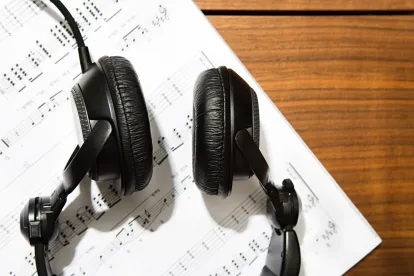Addressing the standard for proving “access” to a copyrighted work, the US Court of Appeals for the Ninth Circuit affirmed the district court’s grant of summary judgment due to a lack of admissible evidence showing sufficient access to plaintiff’s song to prove copyright infringement. Loomis v. Cornish, Case No.13-57093 (9th Cir., Sept. 2, 2016) (Clifton, J).
Loomis and his band recorded “Bright Red Chords” in 2008, released it on a 2009 album and re-released it on a 2010 album. Although the song and corresponding video received some promotion and airplay, as well as a few accolades, the song was not commercially successful by industry standards. The defendants’ accused song, “Domino,” was written in 2011 by a songwriting team spearheaded by Lukasz Gottwald (aka Dr. Luke), in collaboration with Jessica Cornish and others. After hearing “Domino,” Loomis filed a copyright infringement suit against Jessica Cornish, as well as Universal Music Group, Inc., (UMG) and Universal Republic Records (URR).
The defendants moved for summary judgment on the issue of access to Loomis’s song. Proof of access, which is typically based on circumstantial evidence, requires a reasonable possibility that an alleged infringer had a chance to view or listen to the work, not “merely a bare possibility.” Loomis attempted to prove that the defendants had access to his song through various intermediaries who may have had an opportunity to pass his song along to the defendants. For example, a UMG employee asked Loomis’s mother for a copy of Loomis’s song. However, there was no evidence that this employee had any contact with the “Domino” songwriters—the songwriters said they had never met or received anything from that employee. Similarly, a guitar player who did not perform “Bright Red Chords” in the studio, but did play the song live on MTV, ended up joining Katy Perry’s band in early 2010. According to Loomis, this guitarist worked with Dr. Luke during a 10-day recording session for Katy Perry’s Teenage Dream album and could have provided Dr. Luke with access to Loomis’s song during that period. But again, nothing in the record showed any nexus between the guitarist and Dr. Luke’s work on “Domino.” Moreover, Loomis had no personal knowledge of the guitarist actually working with Dr. Luke or Katy Perry during the 10-day recording session, and Loomis’s speculation was not sufficient proof.
Loomis also argued that the “widespread dissemination” of his song proved access. “In most cases, the evidence of widespread dissemination centers on the degree of a work’s commercial success and on its distribution through the radio, television, and other relevant mediums.” Courts also can look to the saturation of the relevant market in which both the plaintiff and defendants participate. Here, the Ninth Circuit agreed with the district court, finding the fact that the Santa Barbara music scene may have been saturated with “Bright Red Chords” during the time that Dr. Luke was in the area for a 10-day recording session with Katy Perry insufficient to raise a triable issue of access. According to the Ninth Circuit, Dr. Luke’s team was focused on recording the album and was not in town to scout new acts, listen to the radio or read local music magazines. The evidence presented by Loomis did not suggest otherwise, but consisted primarily of his speculations unsupported by personal knowledge. For these reasons, the Ninth Circuit affirmed the district court.
Practice Note: Appellant filed a petition for rehearing en banc on September 16, 2016, arguing that the panel decision "would serve as a blueprint for unethical or overreaching content providers to obtain copyrighted work" and infringe "that work with impurity." On October 19, 2016, the same panel that decided the appeal issued an order denying that petition without comment. As the original panel decision explains, showing access to a work for purpose of proving copyright infringement requires some hard evidence of a nexus between Defendant and Plaintiff’s work beyond a “bare possibility” that it could have happened.




 />i
/>i

